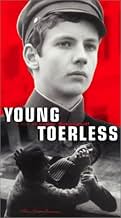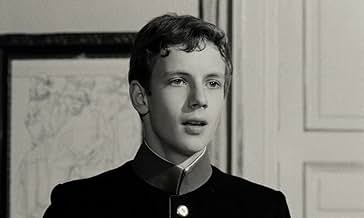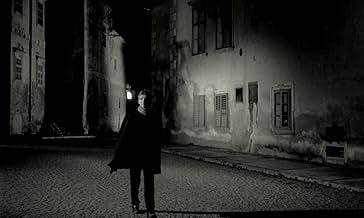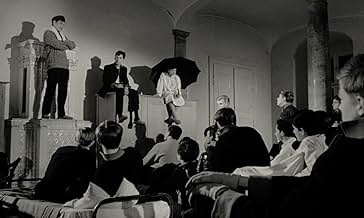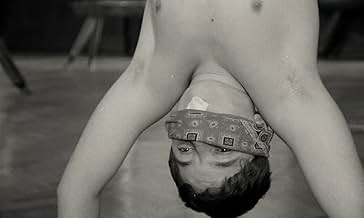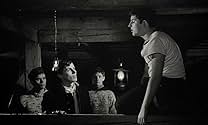AVALIAÇÃO DA IMDb
7,2/10
2,8 mil
SUA AVALIAÇÃO
Adicionar um enredo no seu idiomaIn a boarding school, a student observes in passive disgust as his two friends manipulate, humiliate and torture a fellow student, justifying their every act.In a boarding school, a student observes in passive disgust as his two friends manipulate, humiliate and torture a fellow student, justifying their every act.In a boarding school, a student observes in passive disgust as his two friends manipulate, humiliate and torture a fellow student, justifying their every act.
- Direção
- Roteiristas
- Artistas
- Prêmios
- 4 vitórias e 1 indicação no total
- Direção
- Roteiristas
- Elenco e equipe completos
- Produção, bilheteria e muito mais no IMDbPro
Avaliações em destaque
1. It's been said here that the gay content of the story has been removed. Well, the novel was released in 1905. We can nowadays interpret elements of the story in a gay context, but back then these notions did not exist. If Schlöndorff hints at homosexuality as an element of perversion, that is in fact faithful to the novel, which takes a strictly observatory, non-participating stance.
2. 'Törless' is often interpreted as an indicator of upcoming intolerance and Nazidom. Again, the novel was released at a much too early time to allow for such an interpretation; the novel's author Robert Musil certainly envisioned the inevitable fall of an empire stuck to tradition and incapable of accommodating personal liberties. Schlöndorff pushes some of the juvenile delinquents into similarities with the Nazis - albeit being carefully ambiguous about it -, but it would be wrong to consider this interpretation as a part of the original narrative.
3. 'Törless' is a highly psychological tale and film - again, Schlöndorff proves faithful to the novel in this respect. But this comes with the weakness of constructing characters around a certain social concept. It would be misleading to consider Törless and his rebellious friends as typical representatives of their era, or real figures upon which the author based his characters. As may be more obvious in Musil's masterpiece, 'The Man without Qualities', his characters are crafted to evoke rather a situation than a person; that makes his books almost impossible to adapt correctly.
Schlöndorff's film is somewhat middlebrow; it does not intend to be a substitute for reading the novel, but at the same time it carefully avoids to give the impression that it is anything but a rendition of it. That's not quite true; the interpretation is in the framing, the omissions of the subtext, and that the ideas upon watching the film differ considerably from those you get when you read the novel. One may call it therefore a failure - but an interesting failure to watch.
2. 'Törless' is often interpreted as an indicator of upcoming intolerance and Nazidom. Again, the novel was released at a much too early time to allow for such an interpretation; the novel's author Robert Musil certainly envisioned the inevitable fall of an empire stuck to tradition and incapable of accommodating personal liberties. Schlöndorff pushes some of the juvenile delinquents into similarities with the Nazis - albeit being carefully ambiguous about it -, but it would be wrong to consider this interpretation as a part of the original narrative.
3. 'Törless' is a highly psychological tale and film - again, Schlöndorff proves faithful to the novel in this respect. But this comes with the weakness of constructing characters around a certain social concept. It would be misleading to consider Törless and his rebellious friends as typical representatives of their era, or real figures upon which the author based his characters. As may be more obvious in Musil's masterpiece, 'The Man without Qualities', his characters are crafted to evoke rather a situation than a person; that makes his books almost impossible to adapt correctly.
Schlöndorff's film is somewhat middlebrow; it does not intend to be a substitute for reading the novel, but at the same time it carefully avoids to give the impression that it is anything but a rendition of it. That's not quite true; the interpretation is in the framing, the omissions of the subtext, and that the ideas upon watching the film differ considerably from those you get when you read the novel. One may call it therefore a failure - but an interesting failure to watch.
people should not be distracted about the specifics of the plot,or the tangential,secondary themes of cruelty/sexuality..schlondorf has made his metaphor clear and passionate..people in positions of power(due to talent,wealth,titles of authority,physical stregnth,etc)are not entitled to abuse others,no matter what their alleged justification;and people who witness such abuses and do nothing are worse than enablers, they are accomplices..the obvious association is with the Nazis,but this is a universal problem that could be likened to the Spanish inquisition,the salem witch trials,the torture of prisoners during the iraq war,the red scare hearings and countless others..my own feel is that torless is held up as someone who contributes mightily to this particular evil,but fools himself into thinking he's not involved..his final speech was a lame attempt to justify his conduct..the film may not have been entertaining,but it was thought-provoking
Young Törless is a pertinent reflection on good and evil and the way an individual behaves, given the lack of values in others.
In comparison with the moral and ethical values required by institutions, human behavior seems to follow an errant, amoral path, simply determined by chance, or the current of events. Especially when manifested in a group, human beings lose any values and act according to the tide. They practice excesses and suffer humiliations instinctively, as if they were a fatality of life.
The few who show the courage to remain faithful to fundamental values are marginalized, seen as outsiders, labeled as dreamers.
Being a German film from 1966, it is impossible not to relate this criticism to the rise and fall of Nazism, just 21 years earlier.
A film in which Volker Schlöndorff puts a finger on the wound of Nazism, still open in German society, and forces his compatriots to reflect on the mistakes of the past.
In comparison with the moral and ethical values required by institutions, human behavior seems to follow an errant, amoral path, simply determined by chance, or the current of events. Especially when manifested in a group, human beings lose any values and act according to the tide. They practice excesses and suffer humiliations instinctively, as if they were a fatality of life.
The few who show the courage to remain faithful to fundamental values are marginalized, seen as outsiders, labeled as dreamers.
Being a German film from 1966, it is impossible not to relate this criticism to the rise and fall of Nazism, just 21 years earlier.
A film in which Volker Schlöndorff puts a finger on the wound of Nazism, still open in German society, and forces his compatriots to reflect on the mistakes of the past.
By today's standards, a film like "Young Torless" may seem too coy and archly philosophical (and thus pretentious) a take on the corruption of youth, and the sources from which the corruption stems. Its strength, however, lies in the telling: when a student at a preparatory academy robs a peer to pay off a debt, he finds himself enslaved, both psychologically and sexually, by a gang of rogues looking to push him to the breaking point. In the midst of this is Torless (Matthieu Carriere), a student coming to terms with his identity in the midst of this moral dilemma, and whose mental landscape renders him a frustrated, conflicted character who runs the gamut from cold detachment to vague sympathy. While certain aspects of the film (the homosexual subplot, for instance) seem deliberately repressed due to the era, the implication is enough to give the events an additional potency. The black-and-white cinematography is excellent, capturing a specific atmosphere of dread and meditative solitude--German director Volker Schlondorff is not looking to titillate with sensationalist content, but instead spin a story of a young adult's struggle with the evils of an imperfect world. And on that level, "Young Torless" is one of the best films of its kind.
Volker Schlondorff has been acclaimed by critics for such films as 'The Tin Drum', 'The Lost Honour of Katherina Blum', and 'Coup de Grace'; all of them films based on fine novels by Gunter Grass, Heinrich Boll and Marguerite Yourcenar respectively, and yet forerunner though he was to the German New Wave Cinema has never been quite given the same acclaim as Wim Wenders, Werner Herzog and Rainer Werner Fassbinder, and I wonder if it is because he films (excellently) from literary sources. His films have a cold look and an enquiring one and 'Young Torless' based on Robert Musil's novel 'The Confusions of Master Young Torless' is one of his best adaptations. The book is as coldly written as the film, and Schlondorff does it justice by using an austere black and white photography, but has as soundtrack Hans Werner Henze's fine if equally emotionless score. Sadly in the current climate of cinema most of these names will seem unknown, lost in the mists of the latter part of the 20th Century. As so many reviewers have given away the plot I will not give in to too many spoilers other than to say it is set on the Austrian-Hungarian border land in an Academy for young male students. In 1906 when it was published there was no such conception of Nazism as we know it, nor was there much in print on sadistic, murderous homosexual torture. Even in 1966 it was brave to put this on film and so unsparingly, and his choice of cast was well chosen. Mathieu Carriere plays the lead role as the 'watcher' and sometimes participator of these perverse pleasures taken by two other students as well as him, and most of the time he looks piously on, studying evil more than opposing it and becomes the worst of all of them as he condones by reason what he sees before him. He is in a way a coward, and unlike the other two admirably played by Bernd Tisch and Fred Diets he hypocritically shows less sexual and sadistic pleasure. I regret that the homosexuality was only obliquely shown, but given the nature of the subject in 1966 it was 'normal' to withdraw the camera for what would have been unacceptable viewing, and only the brutality of the sadism is sickening and fully shown. I give it a 10 for its brilliant attempt to tackle the Musil book and there is a certain failure in the director's approach by him being too cautious, but all the same it succeeds on so many levels that I feel it deserves a 10. It was unique then, and should not be as forgotten as it is now, and was in its way also a forerunner of openly homosexual subject matter. Its political aspects are made too much of as in my opinion it shows the savagery of men hidden away behind polite surfaces; a subject matter as controversial as it is still, and I am thinking of the recent film 'Goat' dealing with hazing in modern Academic schools which has equally been given less distribution than it should have been.
Você sabia?
- CuriosidadesLuchino Visconti had previously tried to set up a version of " Young Torless " with Romy Schneider starring.
- Citações
Thomas Törless: Yet another day to tell our grandchildren about.
- ConexõesFeatured in Film Review: International Films (1968)
Principais escolhas
Faça login para avaliar e ver a lista de recomendações personalizadas
- How long is Young Törless?Fornecido pela Alexa
Detalhes
- Data de lançamento
- Países de origem
- Idioma
- Também conhecido como
- Young Törless
- Locações de filme
- Eggenberg Palace, Graz, Styria, Áustria(military school)
- Empresas de produção
- Consulte mais créditos da empresa na IMDbPro
- Tempo de duração
- 1 h 27 min(87 min)
- Cor
- Mixagem de som
- Proporção
- 1.66 : 1
Contribua para esta página
Sugerir uma alteração ou adicionar conteúdo ausente

